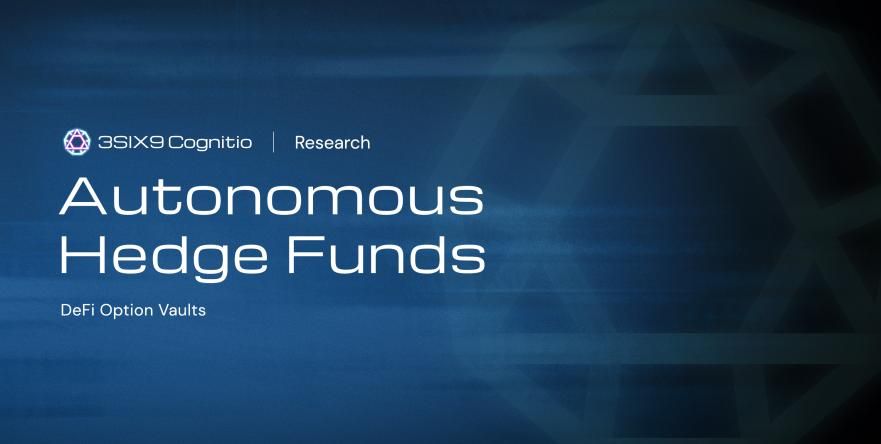Autonomous Hedge Funds: DeFi Option Vaults

This blog post serves the purpose of being a short introduction to the content of the actual paper. The actual paper (in PDF format) can be found in the 3six9 Innovatio Documentation.
This is the first in a series of papers about Autonomous Hedge Funds.
Find the paper here: Autonomous Hedge Funds: DeFi Option Vaults
Purpose of This Paper
DeFi has emerged over the years to include copies of traditional financial services, from trading currencies and derivatives to providing loans in the pursuit of greater capital efficiency. What's changed between TradFi and DeFi is the democratized nature of finance through decentralization, and that opens doors to all kinds of investors that would not otherwise be available. An example of this are hedge funds in traditional finance: what was once limited to accredited investors with high net worth can be built on the blockchain and opened to anyone with a crypto wallet and some know-how. Operating costs and fees for a hedge fund drop significantly when operations are limited to software and operations are coded into smart contracts.
This upcoming series of papers explores deeper into what we call Autonomous Hedge Funds. Each paper in the series aims to clarify different angles in this space, starting with DeFi Options Vaults. In this first volume, we analyze eight protocols with strategies built on top of options platforms, all providing a simplified approach for DeFi investors to compound returns in ways seen in TradFi, and those original to DeFi. By the end you'll have a framework to extract key takeaways from these and other protocols, by looking at their offers, how they are managed, and what kinds drawbacks are faced with DOVs.
We hope that this paper can act as a source of information for those interested in this niche or in developing a new solution.
Short Introduction
In our ‘Automated Vault Strategies’ series, many of the DeFi protocols - building on top of already existing money legos - are covered. We refer to these as structured products because they take existing and complex mechanics and build an easy-to-use product around them, often by taking away the management of capital from users. It's a revolutionizing aspect of DeFi: the composability allows for continuously new iterations, innovations, and advancements to be made.
Traditionally, these capital management services were only available to wealthy individuals, because the companies offering similar services are heavily regulated and required to impose strict criteria to their customers. This varies per jurisdiction, but most hedge funds have their clients meet membership criteria of a net worth of at least $1mln, an income of a minimum of $200k in the last two years or/and a minimum deposit of $100k. These requirements are a result of strict regulations on capital management firms and to ensure that clients are accredited investors and therefore should have the acumen to understand the risks of the strategies that hedge funds typically use. Funds can and do make exceptions to these criteria, usually for the proverbial family and friends, since the SEC allows them to accept up to 35 non-accredited investors over the life of the fund. But they will usually just stick to the accredited-investor guidelines; some set even higher net worth or earned-income level minimums.
DeFi breaks this paradigm and opens up the possibility for anyone to take advantage of hedge fund-like strategies. Due to their decentralized and autonomous nature, smart contracts take care of the management of depositors’ funds and are directed by code. Nowadays, there are a wide variety of vault types that will be discussed in each installment of this series.
Options trading is an enormous part of traditional finance with retail investor platforms such as Robinhood counting on this product for around 40% of their revenue. However, as of writing, the Securities and Exchanges Commission is considering new regulation focused on limiting the participation of retail investors to the options market. With both Fidelity and Robinhood being held in a lawsuit over “systematic supervisory failures”, the main accusation point stands in letting uneducated users access hazardous financial instruments thanks to the low fees offered.
This limit on accessibility to retail option trading in TradFi could attract a whole new user base to the permissionless setting of DeFi.
Find the paper here: Autonomous Hedge Funds: DeFi Option Vaults
3six9 Cognitio is very dedicated to its research philosophy. We really hope that you will join us on this journey.
Semper Ad Meliora
If you have any questions/feedback/ideas - feel free to raise them on any one of our social channels and we will happily engage.
Thank you for reading Insurgent!
🗡 ABOUT 3six9 Cognitio
3six9 Cognitio is the 3six9 Innovatio research and education wing which is currently researching on a variety of topics such as undercollateralized loans, zkKYC, optimized stablecoin designs and much more.
Our team of researchers and content writers work in tandem with 3six9 Core Team. The goal is to have an in-house team to cover all of 3six9 needs with regards to content, impactful research and analysis that we can leverage when building out our products, as well as pushing interesting research papers for our community.
Our goal with 3six9 Cognitio is to also build out a central hub for all things crypto. We aim to build a place where it's easy to learn about the complex crypto space in a digestible way. Onboarding and welcoming new users to the space is important to us. As well as keeping our community up to date with the latest Open Finance related trends and providing you with alpha.
If you would like to contribute to our research endeavors, reach out through any of the following channels:
- Twitter: https://twitter.com/xen
- Email: xen@3six9.io
- Discord: 🗡禅🗡#0369
